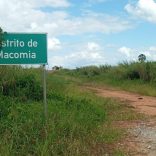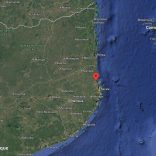South Africa: Mozambican hawkers accuse Lebombo border officials of extortion
WATCH: Journalists barred from Vilanculos murder trial – AIM report

Miramar
The trial of one of those allegedly involved in the April 2016 assassination of prominent prosecutor Marcelino Vilanculos began in the southern Mozambican city of Matola on Wednesday – but journalists were denied access, in flagrant violation of the legal principle that trials, with very few exceptions, are open to the public.
To ensure greater security, the trial is being held, not in a normal Matola courtroom but in the grounds of the prison where the suspect, Edith d’Campta da Camara Cylindo, is being held.
Journalists did not know of this change of venue, and so a large number went to the Maputo Provincial Court in Matola, where they were redirected to the prison.
But, according to the daily paper “Noticias”, when they arrived there, the prison guards refused to allow them in, claiming they had not been informed that journalists would be attending.
They then demanded credentials issued by the Supreme Court, or by the Attorney-General’s Office, or by the General Directorate of the National Prison Service (SERNAP).
So the reporters contacted the Supreme Court press office, only to be told that SERNAP was the body responsible. Bur SERNAP simply passed responsibility back to the Supreme Court, saying it was the Court that should have granted journalists access.
The trial was due to begin at 10.00 – the journalists, hoping that a solution would be found, waited until 14.00 before giving up. Attempts to speak to the prison director himself were fruitless, since he was at a funeral.
What is known so far of the prosecution case is that Edith Cylindo is accused of following Vilanculos’s car between his home and his office for four days prior to the murder, thus familiarising herself with the route.
She had been contacted by one of the assassins, Jose Aly Coutinho, to help those recruited as hitmen, Amad Mabunda and Abdul Tembe, to identify the victim. So not only did she follow the prosecutor’s car, but she also photographed Vilanculos, and gave the photos to Coutinho.
According to the prosecution, after the murder Coutinho paid Cylindo 500,000 meticais (about 8.200 US dollars).
Cylindo’s case is being heard separately because she was arrested later than Coutinho, Mabunda and Tembe. The case against them was well advanced before she was detained.
Of the three, only Mabunda remains in custody, Tembe, believed to have driven the car used in the killing, escaped from Maputo central prison on 24 October 2016. This led to the arrests of the director of the prison, Castigo Machaieie, and eight other prison staff.
Coutinho was murdered on 24 April this year, presumably in order to silence him. He, and another prisoner, Jose Muchanga, apparently not involved in the Vilanculos murder, were released from police custody, when an armed gang attacked the vehicle carrying them at around midday in a narrow street in central Maputo.
It was initially thought that the gang had intervened to rescue Coutinho and Muchanga, but their bodies were later found in a shallow grave about 70 kilometres north of Maputo. They were killed only a few hours after they had been seized from the police.
The Attorney-General’s Office was convinced that Coutinho was in league, not only with Cylindo, but also with one of the country’s most notorious assassins, Momade Assife Abdul Satar (better known as “Nini”).
In January 2002, the Maputo City Court found that Satar was one of the three business figures who had ordered the murder, in November 2000, of the country’s foremost investigative journalist, Carlos Cardoso. Satar was sentenced to 24 years and six months imprisonment, but was released on parole in 2014 after serving just half his sentence, on the ground that he had shown “good behaviour” while in the Maputo top security prison.
Police and prosecutors, however, were convinced that, far from being a model inmate, Satar had been active, from his prison cell, in planning other crimes, including the kidnappings of business people. Satar never had any problem in acquiring cell phones, even though such devices are not allowed inside prisons.
Satar was charged in a 2013 kidnap case – but the presiding judge scrubbed his name from the list of suspects. That same Maputo judge, Aderito Malhope, later in 2014, authorised Satar’s request to travel abroad, supposedly for medical treatment, though it was not stated what condition he suffered from which required treatment outside of Mozambique.
He was supposed to go to India, but the parolee never set foot in that country. Supposedly, he changed his mind and went to London instead. He has never returned to Mozambique, but keeps a Facebook page detailing at least some of his travels, including to Geneva and Lisbon.
The PGR, however, continued to investigate Satar’s connections with the kidnappings and his name is on the charge sheet in two cases opened earlier this year. The PGR only went public with this information after Coutinho was sprung from police custody.
During the latest investigations, said a PGR statement in April, “it was found that the accused, Momad Assife Abdul Satar, formed a criminal organization with the purpose of kidnapping Mozambican citizens, so that later large amounts of money in ransom could be demanded”. To this end, he formed “a criminal alliance” with Coutinho, and with Edith Cylindo.
In light of these findings, the PGR issued an international arrest warrant, and asked the Maputo City Court to revoke Satar’s parole status. The City Court agreed and cancelled Satar’s parole in a dispatch dated 21 April. From that moment, Satar became a fugitive. If he is returned to Maputo and found guilty of any of the crimes of which he is now accused, he will also have to serve the remainder of his sentence for the Cardoso murder.

Vilanculos, a man with a reputation for great integrity, was murdered outside his Matola home on 11 April 2016. He was the lead prosecutor in several sensitive cases, including some of the kidnappings of business people.
He was known to be investigating Danish Satar, nephew of Nini Satar, accused of being one of those behind the kidnappings, who was deported from Italy to Maputo by Interpol in December 2015.
Danish Satar was released from preventive detention on 6 June 2016, but three days later he too was kidnapped in the Maputo neighbourhood of Sommerschield. He has not been heard of since, and police suspect that this was not a genuine kidnapping at all, but merely a way of spiriting Satar out of the country.












Leave a Reply
Be the First to Comment!
You must be logged in to post a comment.
You must be logged in to post a comment.